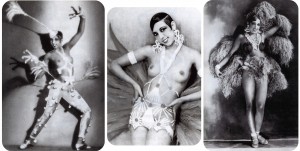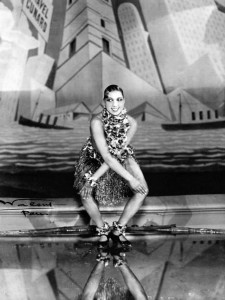In 1951 Ivan Black, the press agent for the Cafe Society clubs, became involved in a bitter battle with Walter Winchell, the all-powerful columnist and radio personality. Josephine Baker, the New York raised, African American dancer who had become one of the most famous entertainers in France, went to the Stork Club — at the time, one of New York’s top clubs and celebrity hangouts. Ms. Baker felt she received rude service because of her race and she made her displeasure known. A radio talk show guy, Barry Gray, took up Baker’s cause and criticized Sherman Billingsley, the Stork Club proprietor. Billingsley was a Winchell pal (WW had a nightly table in the Club’s super-exclusive Cub Room). The battle was on: Barry Gray and Ivan Black VS the Stork Club and Walter Winchell. WW accused Baker of fascist sympathies and communist ties. (Baker sued WW for defamation — but the timid State Department refused her a visa for some years so she was unable to take the suit to court). WW characterized Barry Gray and Ivan Black (who was also the press agent for the restaurant where Gray broadcast) as “commie sympathizers.” In WW’s columns, Gray was ” Borey Pink” and Black was “Ivan Pink.” Such was Winchell’s power that Gray was hounded out of New York. He relocated to Miami where he was very successful and later returned to New York as a popular (and politically conservative) radio gabber. Today, he is acknowledged as the “Father of Talk Radio.” Ivan, a gentle and scholarly Harvard graduate, had some business reverses but survived. The Ivan Black papers at the New York Public Library (some 55 boxes of press releases, clippings, photos and musical scores) are an invaluable historical source for the night club and jazz scene in New York (1937-1978).
Winchell? Television destroyed him. His TV show was a flop. Soon his radio broadcast and column disappeared. With chagrin, he watched his old rival, Ed Sullivan, become a TV icon. (Yes, WW did voice overs on “The Untouchables” TV show but that was just nostalgia shtick). WW died, quite forgotten, age 74. HG is ambivalent about WW. Winchell liked the prose HG contributed to his column and gave HG clients favorable mention. HG’s career as a press agent got a jump start when Winchell printed, in bold face, a prose poem HG authored. WW sent HG a note: “Keep it comin’, keed–WW.” And that’s what HG has done for many a year.
As for Abel “Strange Fruit” Meeropol who was mentioned in Part I of the University Place posts: He and his wife adopted the two orphaned young sons of atom spies Julius and Ethel Rosenberg. Both boys grew up to be college professors. Their childhood with the Meeropols was a happy one. Abel, they recall, was a master of comic improvisations and impersonations. He kept them laughing. After the torment that those boys went through, HG is certainly thankful for that.


Such interesting lookback, HG. I remember the crackle of WW’s voice on the Philco table radio in our apt. in Wash, although I was much interested in the Shadow (“Who Knows What Evil Lurks in the Hearts of Men?_ and the stirring theme from the William Tell Overture that announced The Long Ranger (and Tonto, of course)……
And, from that era, I remember early in my career as a reader reading the warning on a cigarette machine at Scholl’s Cafeteria in Wash DC: “NO MINORS MAY PURCHASED CIGARETTES.” This was the time of bushy-eye-browed John L Lewis leading the coal miners’ strike, displeasing Harry Truman, and so I assumed that Truman was striking back by forbidding miners to buy cigarettes. Around the time I met you, HG, which is to say quite a while later, it suddenly popped into my head: “Oh, that sign said minors, not miners!” But then, HG surely knew that all along…..
Thanks for this wonderful two-part cultural history. I’ve long been enthralled by the Rosenberg story, in the context of the Los Alamos facility and the intellectual radicalism of the late 40’s and 50’s. I actually recall the early 70’s when the Meeropol boys began their mission to absolve their parents.
You may know that Klaus Fuchs met his conduit Harry Gold in Santa Fe. Fuchs would come down from Los Alamos, and they would typically stay at La Fonda. They met most often on the bridge over the Santa Fe River where Paseo de Peralta crosses at Alameda. PdP didn’t exist then, and that bridge is gone. But the one at Delgado, just upriver, is still there and is identical to the infamous one. I guess the gurgling water and automotive noise concealed their conversations, at least for a while.
You may also know that E. L. Doctorow penned a novel, The Book of Daniel, based on the Rosenbergs and their children (he made one a girl).
And then there’s this from a couple of years ago:
http://www.nytimes.com/2008/09/17/nyregion/17rosenbergs.html?pagewanted=all
We’ve had the fortune, good or bad or indifferent, to live in interesting times.